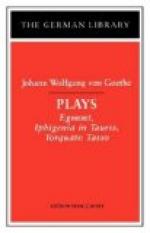Egmont. How rarely does a king attain wisdom! And is it not fit that the many should confide their interests to the many rather than to the one? And not even to the one, but to the few servants of the one, men who have grown old under the eyes of their master. To grow wise, it seems, is the exclusive privilege of these favoured individuals.
Alva. Perhaps for the very reason that they are not left to themselves.
Egmont. And therefore they would fain leave no one else to his own guidance. Let them do what they like, however; I have replied to your questions, and I repeat, the measures you propose will never succeed! They cannot succeed! I know my countrymen. They are men worthy to tread God’s earth; each complete in himself, a little king, steadfast, active, capable, loyal, attached to ancient customs. It may be difficult to win their confidence, but it is easy to retain it. Firm and unbending! They may be crushed, but not subdued.
Alva (who during this speech has looked round several times). Would you venture to repeat what you have uttered, in the king’s presence?
Egmont. It were the worse, if in his presence I were restrained by fear! The better for him and for his people, if he inspired me with confidence, if he encouraged me to give yet freer utterance to my thoughts.
Alva. What is profitable, I can listen to as well as he.
Egmont. I would say to him—’Tis easy for the shepherd to drive before him a flock of sheep; the ox draws the plough without opposition; but if you would ride the noble steed, you must study his thoughts, you must require nothing unreasonable, nor unreasonably, from him. The burgher desires to retain his ancient constitution; to be governed by his own countrymen; and why? Because he knows in that case how he shall be ruled, because he can rely upon their disinterestedness, upon their sympathy with his fate.
Alva. And ought not the Regent to be empowered to alter these ancient usages? Should not this constitute his fairest privilege? What is permanent in this world? And shall the constitution of a state alone remain unchanged? Must not every relation alter in the course of time, and on that very account, an ancient constitution become the source of a thousand evils, because not adapted to the present condition of the people? These ancient rights afford, doubtless, convenient loopholes, through which the crafty and the powerful may creep, and wherein they may lie concealed, to the injury of the people and of the entire community; and it is on this account, I fear, that they are held in such high esteem.




